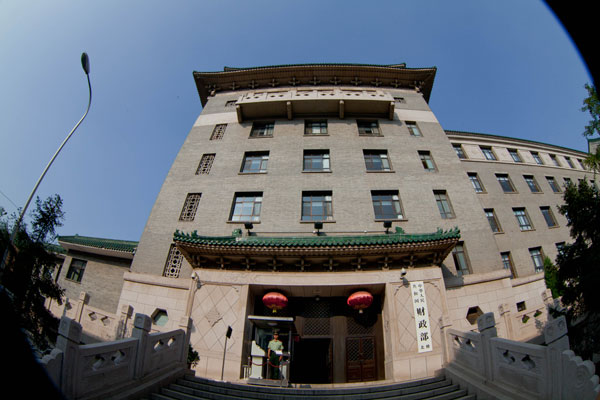

|
 The headquarters of the Ministry of Finance in Beijing. The ministry is responsible for China's taxation policies. Provided to China Daily |
It is high time to rein in the income of the government and corporate sector and boost household incomes, a prominent economist has suggested.
Liu Kegu, former vice-president of China Development Bank and a member of the Chinese People's Political Consultative Conference National Committee, the country's top political advisory body, said the income of the government is already high and should not be raised anymore.
"When many pundits say China's tax burden level is not high, standing at 19 percent, it is misleading because this measures the narrowest scope of tax, the general public finance," the outspoken fiscal expert said at the just-concluded China Economic Annual Conference, hosted by the China Center for International Economic Exchange.
A number of key quasi-taxes are not included, according to him. A social security fund in most countries is counted as a tax but is disguised as a "fee" in China. Land transfer fees, a large chunk of government revenue that accounted for more than 6 percent of the country's gross domestic product, is also not included.
"Many argue that when the government earns fees from land transfers, it loses its land and this does not result in a change in its balance sheet. But does the government really lose its land? It is merely offering a 70-year property lease on the land. The land transfer fee should be regarded as 70 years of rent for the land," he said.
Combining these funds, China's real tax burden as a share of GDP should be 31.57 percent, according to Liu, a level a little higher than the average among the world's upper-middle-income countries. China is counted by the World Bank as an upper-middle-income country.
"What does this mean? It means the government income as a share of national income should not be raised any more. It means the goal of 1994 fiscal reform has been realized," he said.
Liu participated in the overhaul of China's fiscal system in 1994. The reform set out to solve two critical flaws in China's fiscal system: the overly low fiscal revenue-to-GDP ratio and the overly low central government revenue-to-overall revenue ratio. The reform significantly boosted the disposable revenue of central government and was regarded as a watershed for China's economy.
Related readings:
China's fiscal revenue maintains fast growth
Video: China's fiscal reforms needed
Changes lower tax burdens
Official calls for reforms to help ease tax burden
How heavy are our tax burdens?
 Christmas sales attract customers in China
Christmas sales attract customers in China
 Smooth ride at Harbin amusement park
Smooth ride at Harbin amusement park
 In the frame
In the frame
 China-exclusive new Citroen DS 5LS sedan in Paris
China-exclusive new Citroen DS 5LS sedan in Paris
 Lamborghini launches Aventador LP 720-4 50° Anniversario
Lamborghini launches Aventador LP 720-4 50° Anniversario
 Model with modified Audi R8
Model with modified Audi R8
 Bordeaux wine shop and bar opens in Beijing
Bordeaux wine shop and bar opens in Beijing
 Chinese bellybands easy to stomach
Chinese bellybands easy to stomach